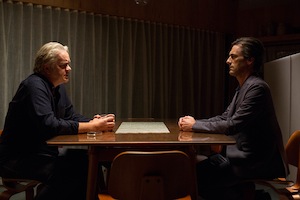Directed by Jan P. Matuszynski
Country: Poland
“The Last Family”, a very humorous yet unsettling biographical drama about the Polish dystopian-surrealist painter Zdzislaw Beksinski, starts with a funny lightness, develops with an enthralling wittiness between the lines, and ends with a harrowing murder scene. Even with death, suicide, and illness playing influential roles in the life of the Beksinskis, the film embraced a spirited mood throughout that was fiercely swept aside with the appalling finale.
The smartly and effortlessly mounted account begins in 1977 and ends in 2005, the year that Zdzislaw, a bit debilitated due to aging, was brutally stabbed to death at his Warsaw apartment by a 19-year-old with whom he was familiar.
At the beginning, and to better set the tone, Jan P. Matuszynski, who directed from a screenplay by Robert Bolesto (“The Lure”), stages an amiable conversation occurred in 2005 between the painter and his chronicler friend, Piotr Dmochowski (Andrzej Chyra). The well-disposed Zdzislaw, superbly played by the veteran actor Andrzej Seweryn, imagines how amazing would be programming a supercomputer to perform some adjustments in Alicia Silverstone according to his sexual fantasies and whims. The story then winds back to 1977 when he and his wife, Zofia (Aleksandra Konieczna), visit and inspect an old apartment in Warsaw to accommodate their only son, Tomasz (Dawid Ogrodnik), a selfish and suicidal neurotic who would become a popular radio presenter, movie translator, and music journalist in the following years. Tomasz struggles permanently with himself, tormented by his flagrant inability to maintain a proper relationship with a woman.
His parents have their respective mothers living with them. When together, the two elder women try to guess who is going to die first in the family. They both bet on Tomasz, but his recurring suicide attempts won’t be successful until the Christmas Eve 1999, time when his father located him dead in his apartment. Ironically, Zdzislaw, who considered suicide an act of courage, congratulates his son for finally having found peace.
One year before, the painter had lost his dear wife to a fatal aneurysm. By that time, besides painting to sell abroad, he was a bit obsessed with making homemade videos, his favorite hobby.
Mr. Matuszynski’s directorial methodology, whether pleasantly elaborated or painfully raw, has a crucial impact on the way the drama evolves.
Packed with dauntless shots and enlightened by the top-notch performances of Seweryn and Ogrodnik, “The Last Family” also scintillates with major production values with prominence for the appropriate period settings and costume design, an unbreakable storytelling suitable to the challenging structure, and an arresting soundtrack spanning several decades. This is an arty biopic not to be missed.




























































